3 Mins Read
The Global Organic Textile Standard (GOTS), the international certification for organic textiles, saw the highest growth in certified operations last year. The news comes as the wider textile industry experiences major shifts towards more sustainable and organic manufacturing processes, driven primarily by changing consumer tastes for more eco-friendly products. Fashion labels, from fast fashion to outdoor apparel are now all collectively incorporating organic textiles more than ever before, alongside other recycled materials.
GOTS recently reported that the number of organic facilities certified by the body grew by 35% in 2019 to reach 7,765 suppliers in 70 different countries, up from 5,760 the previous year. Growth in certification was recorded in both producer and consumer regions, but the most significant increase in the number of organic facilities was seen in Bangladesh, India and Europe.
“With more and more GOTS certified operations and products we altogether substantially contribute to sustainable development,” commented Claudia Kersten, managing director of GOTS.
GOTS added that there were an estimated record of 3 million workers employed in certified organic facilities in 2019.
To be certified as organic under GOTS, facilities must undergo stringent testing. From farming procedures to processing methods, organic products must not involve the use of synthetic chemical pesticides or fertilisers, and are not grown using genetically modified or radiated plants.
Agrochemicals commonly employed in non-organic agriculture is also one of the largest emitters of carbon dioxide in the industry. On the other hand, organic farming methods are widely considered to help promote better biodiversity, soil quality and does not contaminate the environment with run-off substances – which also exposes workers to fewer health hazards.
A 2019 study led by Dutch scientists from the University of Twente found that organic agriculture can help make progress on 8 of the 17 globally agreed Sustainable Development Goals (SDGs), especially on combating climate change, preventing biodiversity loss and achieving zero hunger and clean water for all.
Given the health and environmental benefits of organic products, more eco-conscious consumers are now shifting towards clothing made from organic textiles. In response to consumer demand and pressure to green its operations, the fashion industry is now taking new strides towards using more sustainable fabrics. Some of the major brands that have already achieved the GOTS regulations include outdoor apparel brand Patagonia and bedding company Boll & Branch.
Fast fashion giants are also taking the leap towards organic and recycled alternatives. H&M, for instance, has already increased its use of organic and recycled cotton to 95%, and the group aims to achieve 100% sustainably sourced cotton across its collection this year. Monki, on the other hand, has already used only organic and recycled cotton since 2018.
Aside from employing more recycled and organic textiles in their products, fashion brands are taking on circular solutions such as rental, repair and resale models. Despite representing quick-waste consumer culture, H&M debuted a recycling, repair and rental concept and a rental subscription service under its higher-end sister brand COS collection in China.
Even luxury brands are promoting refurbishment and resale, and most recently, high-end consignment platform Rebag launched a new programme to allow customers to rent, exchange and rent again to keep items out of landfills for as long as possible.
Read more of the latest news about the organic industry here.
Lead image courtesy of 123rf.




